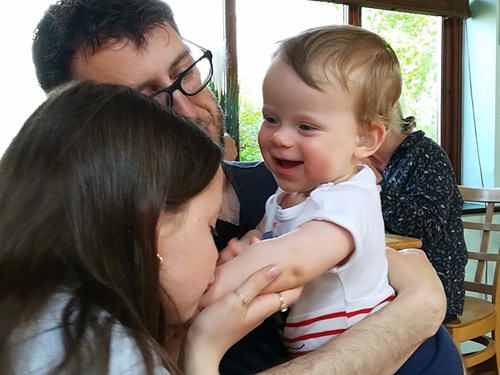Choosing a communication approach for Lucas
Published Date: 02 Jun 2022
Lucas is 10 months old now, which means we have had 9 months to get our heads around the fact that we have the privilege of raising a little boy with a hearing loss. Like 90% of parents of children who are born deaf, my husband and I had no previous experience of deafness or the Deaf community, so we’ve been working hard to understand as much as we can while simultaneously making big decisions about our son’s future. One of those big decisions is deciding how we want our son to learn to communicate - a decision that we were acutely aware would affect the rest of his life.
This is a subject that evokes a huge amount of opinion and emotion among the Deaf community. The more we read, the more intimidating the decision became and the more we felt out of our depth making a decision for our deaf child when we had no understanding of what it meant to be Deaf ourselves.
We are, all of us, incredibly lucky to have a huge amount of supportive communities to draw upon. Facebook groups, local deaf support workers, family support groups and the National Deaf Children’s Society all aim to help parents like us understand more about what it means to grow up with a hearing loss - the good, the bad and the ugly. What struck us the most was the sense of pride that people have about their deafness: their lip-reading superpowers, the beauty of sign language, how they love to revel in the sound of silence. We realised all these things that as hearing parents we want to ‘fix’, are actually the things that will go on to give our son an incredibly unique dimension to his life. We know that building a community of deaf friends around Lucas is going to be incredibly important.
We also learnt that deafness can lead some to feel isolated, left out from conversations and friendships and fatigued by the effort of listening with hearing technology in schools and busy environments. However much we might wish it to be otherwise, we do live in a predominantly hearing world where spoken language is the primary form of communication, and so for us it was important to also give Lucas the chance to hear and speak with the use of cochlear implants.
We will never presume to speak on behalf of the Deaf community or to claim that we understand what it is to be deaf, and I think we will be learning something new every day. But we are parents, and we do have to speak on behalf of our baby son. For that reason, we choose to give him the gift of sound, while also respecting his gift of silence. We choose to give him the chance to use everything that is beautiful about spoken language, while also teaching him how beautiful sign language is. We choose to give him access to as many communities as he wants to be a part of because we know he will have so much to give and so much to learn. Our job now is to make sure he is happy, secure and confident on this journey we’re all about to embark on.
This was our decision, and what is right for us may not be right for you. If you are in the same boat as us, trust your instincts as parents and don’t feel out of your depth just because you are not deaf yourself. There are many kind and supportive communities that will jump at the chance to help you understand what you don’t know already.
